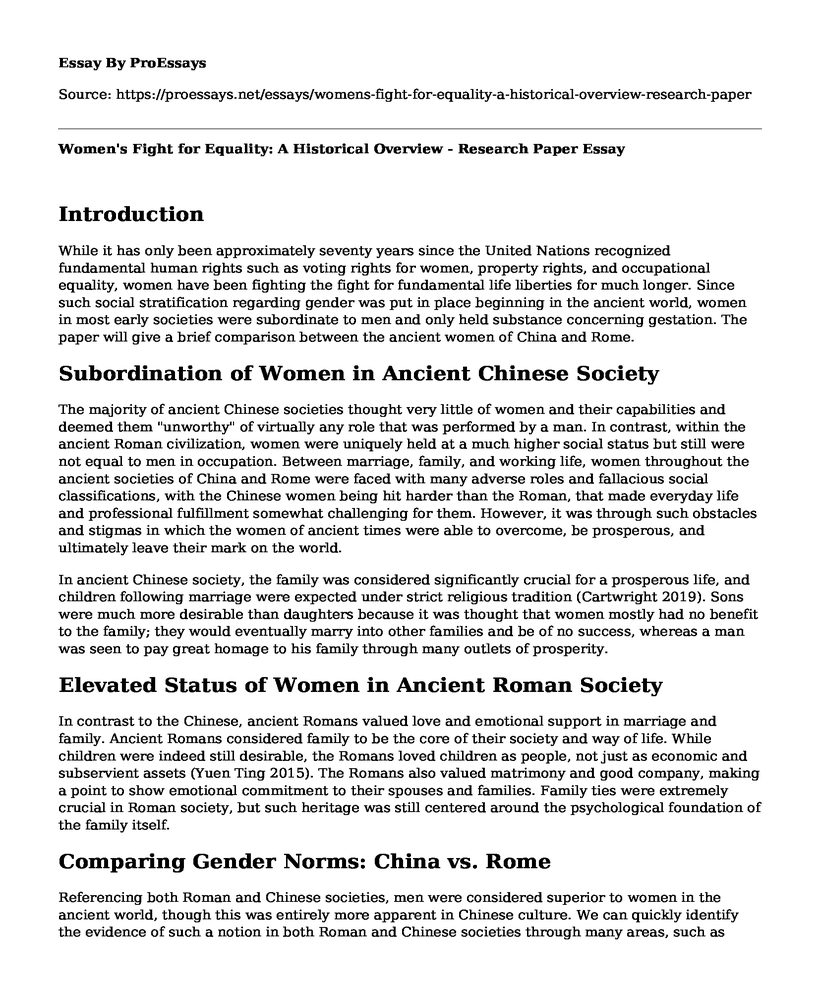Introduction
While it has only been approximately seventy years since the United Nations recognized fundamental human rights such as voting rights for women, property rights, and occupational equality, women have been fighting the fight for fundamental life liberties for much longer. Since such social stratification regarding gender was put in place beginning in the ancient world, women in most early societies were subordinate to men and only held substance concerning gestation. The paper will give a brief comparison between the ancient women of China and Rome.
Subordination of Women in Ancient Chinese Society
The majority of ancient Chinese societies thought very little of women and their capabilities and deemed them "unworthy" of virtually any role that was performed by a man. In contrast, within the ancient Roman civilization, women were uniquely held at a much higher social status but still were not equal to men in occupation. Between marriage, family, and working life, women throughout the ancient societies of China and Rome were faced with many adverse roles and fallacious social classifications, with the Chinese women being hit harder than the Roman, that made everyday life and professional fulfillment somewhat challenging for them. However, it was through such obstacles and stigmas in which the women of ancient times were able to overcome, be prosperous, and ultimately leave their mark on the world.
In ancient Chinese society, the family was considered significantly crucial for a prosperous life, and children following marriage were expected under strict religious tradition (Cartwright 2019). Sons were much more desirable than daughters because it was thought that women mostly had no benefit to the family; they would eventually marry into other families and be of no success, whereas a man was seen to pay great homage to his family through many outlets of prosperity.
Elevated Status of Women in Ancient Roman Society
In contrast to the Chinese, ancient Romans valued love and emotional support in marriage and family. Ancient Romans considered family to be the core of their society and way of life. While children were indeed still desirable, the Romans loved children as people, not just as economic and subservient assets (Yuen Ting 2015). The Romans also valued matrimony and good company, making a point to show emotional commitment to their spouses and families. Family ties were extremely crucial in Roman society, but such heritage was still centered around the psychological foundation of the family itself.
Comparing Gender Norms: China vs. Rome
Referencing both Roman and Chinese societies, men were considered superior to women in the ancient world, though this was entirely more apparent in Chinese culture. We can quickly identify the evidence of such a notion in both Roman and Chinese societies through many areas, such as social standards, occupation, economic stance, and religion. Concubinage was also a significant affair in both ancient societies. However, despite social barriers, both civilizations made way for successful and influential women to emerge from the struggles of their societal stigmas.
Recognizing the differences when comparing the two societies, the Chinese were undoubtedly much stricter on women than the Romans. Women in Roman were held at a tier virtually equal to that of men in their society. Such action was sporadic and uncommon during ancient times and for much of history to follow. Because of the peculiarity of the Roman's societal methods and objective views on women, they are still regularly referenced today when discussing the eternal fight for women's rights, along with many other humanitarian concerns (Brown, 2018). Romans considered women to be equal when it came to marriage, while the Chinese deemed women as nothing more than sexual servants or housemaids. The Chinese did not commonly permit women to possess occupations other than field labor in poverty-stricken cases, prostitutes, and concubines. On the other hand, the Romans allowed women an assortment of job opportunities, ranging from poets to emperors.
Conclusion
Conclusively, women in ancient Chinese society were treated with no honor or respect, and such practice was indeed unwarranted and ill-founded. While Roman women had life increasingly more open, comfortable, and confident, they still struggled with social adversities and inequality that affected their working life and overall social and political status. However, this unnecessary control of women and prejudicial beliefs about them led to the gender as a whole, eventually breaking through the barriers and overcoming societies' obstructive views to be successful, which should undoubtedly be commended.
References
Brown, E. (2018). Ancient Egypt: A Concise Overview of the Egyptian History and Mythology Including the Egyptian Gods, Pyramids, Kings, And Queens.
Cartwright, M., & Joshua J. M., (2019) Ancient History Encyclopedia.
Yuen Ting, L., (2015). "A Comparative Analysis of China and India: Ancient Patriarchy, Women's Liberation, and Contemporary Gender Equity Education." African & Asian Studies, vol. 14, no. 1/2, Mar. 2015, pp. 134-153. Academic Search Complete, DOI:10.1163/15692108-12341244.
Cite this page
Women's Fight for Equality: A Historical Overview - Research Paper. (2023, Apr 28). Retrieved from https://proessays.net/essays/womens-fight-for-equality-a-historical-overview-research-paper
If you are the original author of this essay and no longer wish to have it published on the ProEssays website, please click below to request its removal:
- Paper Example on the Repelling of the ObamaCare Act
- Essay Sample on Immigrants in Richmond and Their Impacts on Kansas
- Connections Between White-Collar and Organized Crime Essay
- Articles Analysis Essay on Street Crime and White-Collar Crime
- Essay Example on Child Neglect: Denial of Basic Needs, Severe Consequences
- Essay Example on Citizenship in America: A Constitutional Right and Responsibility
- Essay Example on Situational Crime Prevention Theory: Adapting to Combat Crime







